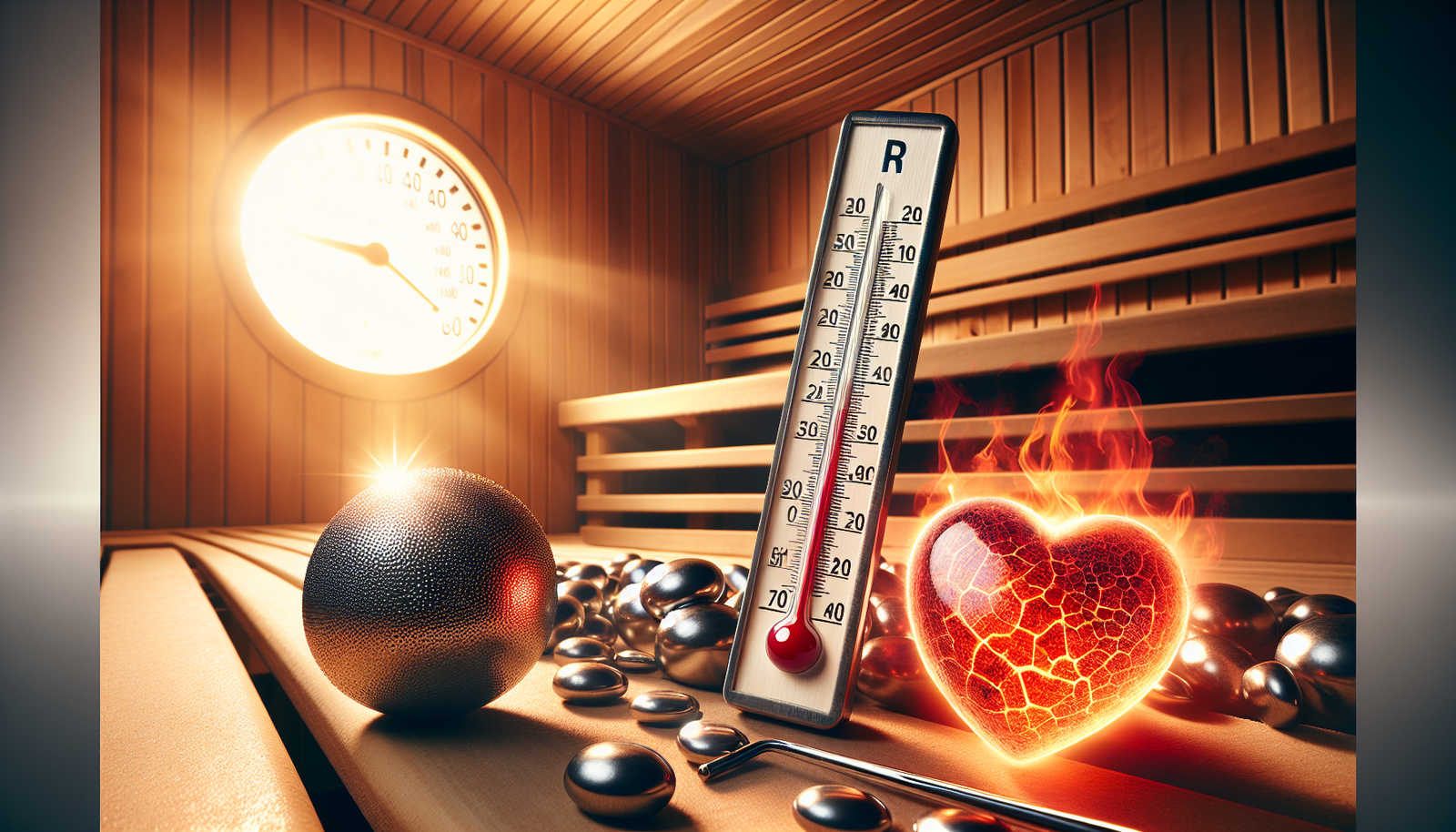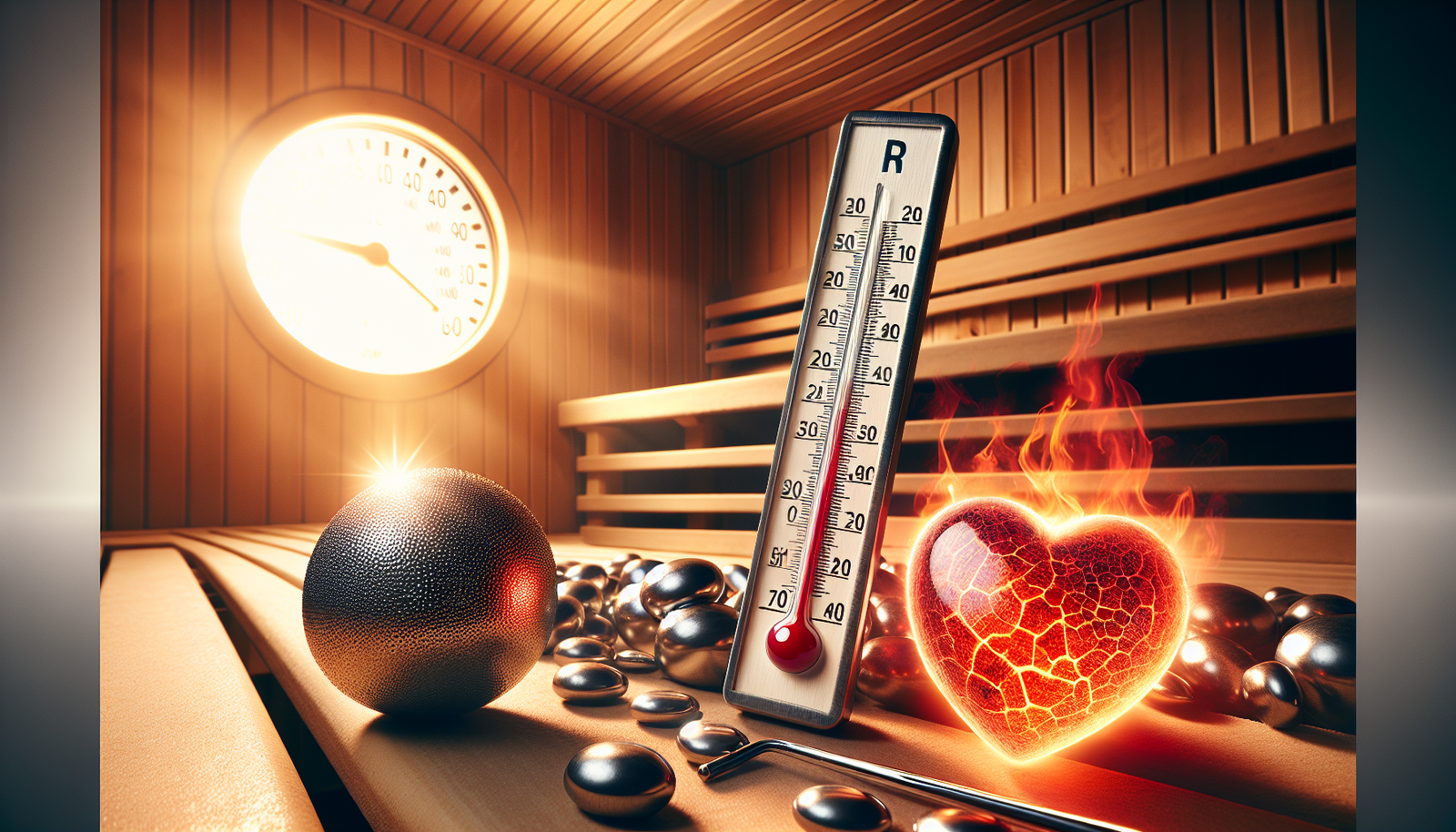So you’re wondering if sitting in a sauna can actually help you burn calories. Well, get ready to sweat, because the answer might surprise you! Saunas have long been associated with relaxation and detoxification, but recent studies suggest that they may also have a positive impact on calorie burning. In fact, spending just a short period of time in a sauna can increase your heart rate, metabolic rate, and ultimately, help you shed those extra calories. So next time you’re considering a sauna session, remember that not only will you leave feeling refreshed and rejuvenated, but you’ll also be one step closer to achieving your fitness goals.

How Does a Sauna Work?
Heat source and temperature
In order to understand how a sauna works, it is important to first grasp the basics of its heat source and temperature control. Traditional saunas typically use a heated stove or rocks to generate heat, while modern saunas often rely on electric or infrared heaters. These heat sources raise the temperature inside the sauna to a desired level, usually between 150 to 195 degrees Fahrenheit (65 to 90 degrees Celsius).
The effect of heat on the body
When you enter a sauna, the high temperature causes your body to heat up as well. This increase in body temperature triggers numerous physiological responses. First, your blood vessels dilate, allowing for better circulation and increased blood flow throughout your body. This can lead to relaxation and a soothing sensation. Additionally, the heat stimulates your sweat glands, leading to perspiration and ultimately, cooling down your body.
Calories and Weight Loss
Understanding calories
Calories are a unit of measurement used to quantify the energy content of food and beverages. When we consume food, our bodies break it down and convert it into energy. This energy is then used to carry out various bodily functions, such as breathing, digestion, and physical activity. The number of calories consumed and burned can play a significant role in weight management.
Relationship between calorie intake and weight
Weight gain or loss is largely dependent on the balance between calorie intake and calorie expenditure. If you consume more calories than your body needs for its daily functioning, the excess calories will be stored as fat, leading to weight gain. On the other hand, if you burn more calories than you consume, your body will tap into its fat stores for energy, resulting in weight loss.
Factors affecting calorie burn
The number of calories burned by an individual varies depending on several factors. These include age, gender, weight, muscle mass, and activity level. Generally, individuals with higher body weights and more muscle mass tend to burn more calories at rest compared to those with lower body weights and less muscle mass.
Benefits of Saunas
Relaxation and stress reduction
One of the primary benefits of saunas is the relaxation and stress reduction they offer. The heat and ambiance of a sauna can help to soothe both the mind and body. Sitting in a sauna can create a calm and peaceful environment, allowing you to unwind and relieve built-up stress. This relaxation can have positive effects on your overall well-being and mental health.
Improved blood circulation
The high temperatures experienced in a sauna promote vasodilation, which is the widening of blood vessels. As a result, blood circulation improves, delivering oxygen and essential nutrients to different parts of the body more efficiently. Improved blood circulation can have a range of benefits, such as faster muscle recovery, reduced inflammation, and enhanced wound healing.
Flushes toxins
Saunas are known to promote sweating, which can help to flush out toxins from the body. Sweating allows your body to eliminate waste products, such as urea and lactic acid, through your skin. This detoxification process can help to cleanse your body and potentially improve your overall health and well-being.
Skin health improvement
The heat and sweating experienced in a sauna can also have positive effects on your skin. Sweating helps to open up your pores, allowing dirt, oil, and other impurities to be released. This can result in clearer skin with fewer blemishes and improved complexion. Additionally, the improved blood circulation can provide a healthy glow to your skin.
Potential for weight loss
While saunas alone are not a magical solution for weight loss, they can potentially contribute to a weight loss plan. The increased heart rate from the heat and the sweating experienced in a sauna can lead to a temporary loss of water weight. However, it is important to note that this weight loss is often regained once you hydrate your body.
The Science Behind Burning Calories
Basal metabolic rate (BMR)
Basal metabolic rate (BMR) refers to the number of calories your body needs to carry out basic bodily functions while at rest. These functions include breathing, cell production, circulation, and maintaining body temperature. Although saunas temporarily elevate body temperature, they do not significantly impact your BMR. Therefore, the number of calories burned in a sauna session is relatively low compared to physical activities that increase heart rate and require more energy expenditure.
Thermogenesis
Thermogenesis is the process by which your body produces heat, resulting in increased energy expenditure and calorie burn. While saunas can contribute to thermogenesis, the calorie burn from this process is minimal. Activities such as exercise, which involve muscle contractions and increased heart rate, are much more effective at stimulating thermogenesis and burning calories.
Role of exercise
Regular physical exercise plays a crucial role in burning calories and achieving weight loss goals. Engaging in activities such as cardio exercises, weightlifting, and high-intensity interval training can significantly boost your calorie burn. In comparison, the calorie burn achieved in a sauna is minor and should not replace the importance of a well-rounded exercise routine for weight management.

Sauna and Calorie Burn
Increase in heart rate
When you enter a sauna, your heart rate increases as your body tries to cool itself down. The elevated heart rate can offer cardiovascular benefits similar to those achieved during moderate physical activities. However, the increase in heart rate alone does not lead to significant calorie burn or weight loss. It is important to remember that saunas are not a substitute for regular exercise.
Sweating and weight loss
As mentioned earlier, saunas can cause sweating, which can result in a temporary loss of water weight. While this may seem like weight loss, it is important to understand that this weight loss is not permanent and is quickly regained once you rehydrate your body. Saunas should not be relied upon as a primary method for long-term weight loss.
Effects on metabolism
Saunas do have some impact on metabolism. The heat exposure can slightly increase metabolic rate, leading to a marginal increase in calorie burn. However, it is crucial to remember that this increase is temporary and does not significantly contribute to weight loss. Sustainable weight loss is achieved through a combination of healthy eating, regular exercise, and overall lifestyle changes.
Calorie burn during a sauna session
The exact number of calories burned during a sauna session can vary depending on several factors, including the duration of the session, temperature, individual metabolism, and hydration status. On average, an individual may burn around 60-100 calories in a 30-minute sauna session. While this might seem like a decent number, it is important to note that other physical activities can burn far more calories in the same amount of time.
Conditions for Effective Calorie Burning
Duration and frequency
To maximize potential calorie burn in a sauna, it is recommended to spend longer durations in the sauna, usually between 15 and 30 minutes. However, it is crucial to listen to your body and not overexert yourself. Additionally, sauna sessions should not be excessively frequent, as this can lead to dehydration and other health risks. A general rule of thumb is to limit sauna sessions to a few times a week.
Temperature and humidity
The temperature and humidity levels in a sauna can also play a role in the effectiveness of calorie burning. Higher temperatures generally lead to increased heart rate, but it is important to ensure that the temperature is within a safe and comfortable range. It is advisable to start with lower temperatures and gradually increase them as your body becomes more accustomed to the heat.
Hydration and water weight loss
It is crucial to stay hydrated before, during, and after a sauna session. Sweating causes the loss of water and electrolytes from your body, which can result in dehydration if not adequately replenished. While it may seem like a temporary weight loss, losing water weight is not a healthy or sustainable method for long-term weight loss. Remember to drink plenty of water to maintain proper hydration levels.
Considerations and Limitations
Individual variations
Individuals may experience different responses to saunas depending on various factors, including age, health conditions, and fitness levels. It is important to consult with a healthcare professional before incorporating saunas into your routine, especially if you have any underlying health concerns.
Temporary weight loss
As mentioned earlier, the weight loss experienced in a sauna is primarily due to water loss through sweating. This weight loss is temporary and is quickly regained once you rehydrate your body. Saunas should not be seen as a long-term solution for weight management, but rather as a complementary component to a healthy lifestyle.
Replenishing lost fluids
After a sauna session, it is important to replenish the fluids lost through sweating. Drink water or electrolyte-rich beverages to restore hydration levels in your body. Avoid consuming excessive amounts of caffeine or alcohol, as they can further dehydrate you.
Safety precautions
Saunas can offer numerous benefits, but it is important to use them safely. Do not exceed the recommended temperature and duration for sauna sessions. If you begin to feel dizzy, lightheaded, or unwell, exit the sauna immediately and cool down. Pregnant women, individuals with certain medical conditions, and those on medications should consult with their healthcare providers before using a sauna.
Comparison with Other Physical Activities
Calorie burn in saunas vs. exercise
When it comes to calorie burn, saunas cannot match the effectiveness of physical activities such as cardio exercises, strength training, or high-intensity interval training. Activities that involve increased heart rate and muscle engagement typically result in higher calorie burn compared to saunas. If weight loss is your goal, incorporating regular exercise into your routine is key.
Complementary benefits
While saunas may not burn a significant number of calories, they offer other benefits that can complement a healthy lifestyle. The relaxation, stress reduction, improved blood circulation, detoxification, and skin health benefits of saunas can enhance overall well-being and contribute to a holistic approach to health.
Incorporating Saunas into a Weight Loss Plan
Supplementing a healthy diet
While saunas alone may not lead to substantial weight loss, they can be a supportive element in a well-rounded weight loss plan. Alongside a healthy and balanced diet, saunas can provide relaxation and stress reduction, which are often important factors in maintaining long-term weight management.
Combining with exercise
For optimal weight loss results, it is important to combine saunas with regular physical exercise. Engaging in cardiovascular activities, strength training, and other exercises that elevate heart rate and increase calorie burn can help you achieve your weight loss goals. Saunas can be used as a post-workout relaxation tool, assisting in muscle recovery and reducing post-exercise soreness.
Finding a balance
When incorporating saunas into a weight loss plan, it is essential to find a balance that works for you. Remember that saunas alone will not lead to significant weight loss, and focusing on a comprehensive approach that includes exercise, a healthy diet, and other lifestyle factors will yield better results. Consult with a healthcare professional or a certified fitness trainer to create a personalized plan that suits your needs and goals.
Conclusion
While saunas offer various benefits such as relaxation, improved blood circulation, and skin health, their impact on calorie burn and weight loss is relatively minor. Saunas can produce a temporary loss of water weight through sweating, but this weight loss is quickly regained once you rehydrate your body. For sustainable weight loss, it is important to focus on a well-rounded approach, including healthy eating habits, regular physical exercise, and overall lifestyle changes. Saunas can be a complementary component in this journey but should not be relied upon as the primary means of achieving weight loss goals. Remember to use saunas safely, stay hydrated, and consult with a healthcare professional before beginning any new health or fitness routine.

